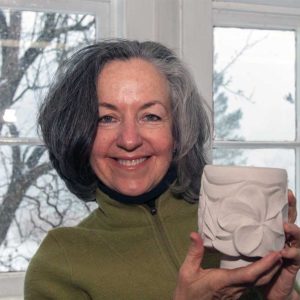Leslie Ferst
Born in Atlanta, Leslie Ferst studied ceramics at Boston University (MFA cum laude), Art History at Skidmore College (BA) and Syracuse University in Italy and Amsterdam. For artist residencies, she traveled to Montana (Archie Bray Foundation), Georgia (Ossabaw Island Foundation), and Maine (Watershed Center) where she was a founding Board Member.
For the past 24 years, Leslie has worked in her studio and gardens located in southern Washington County. She creates organic sculptures, porcelain landscape paintings and functional work all of which are influenced by her eclectic gardens, tranquil pond and the beautiful view that surround her west-facing studio.
During her 30 + years working as a professional artist, Leslie taught ceramics at liberal arts colleges in both New York and Vermont, most recently at Skidmore College where she taught ceramics in the Art Department for 20 years. She currently teaches workshops at established Art Centers and schools in which she challenges her students to think “within and outside the bowl” and to grow with their work in unique ways and unexpected directions.
Leslie has exhibited from coast to coast. Her work is in over 100 public and private collections nationally and internationally and has been included in numerous national publications. She has received grants for specific projects from the New York Foundation for the Arts, the Rensselaer County Council on the Arts, The Empire State Crafts Alliance, the Vermont Council on the Arts, and several Skidmore College Faculty Development Grants.
Artist Statement
“My lifelong interest in architecture and botany, combined with a continuing interest in Art History, inform an ongoing dialogue with my work. I am driven by the interplay between reality, illusion and memory to create organic, natural spaces to inhabit. My most recent sculptures are abstractions reminiscent of botanical shapes, rhythms, patterns and details from fragile ecosystems I know and observe. While each individual form stands alone, they may be installed in dynamic and evocative groups to remind us of our unambiguous, delicate and primal relationship with nature.”
